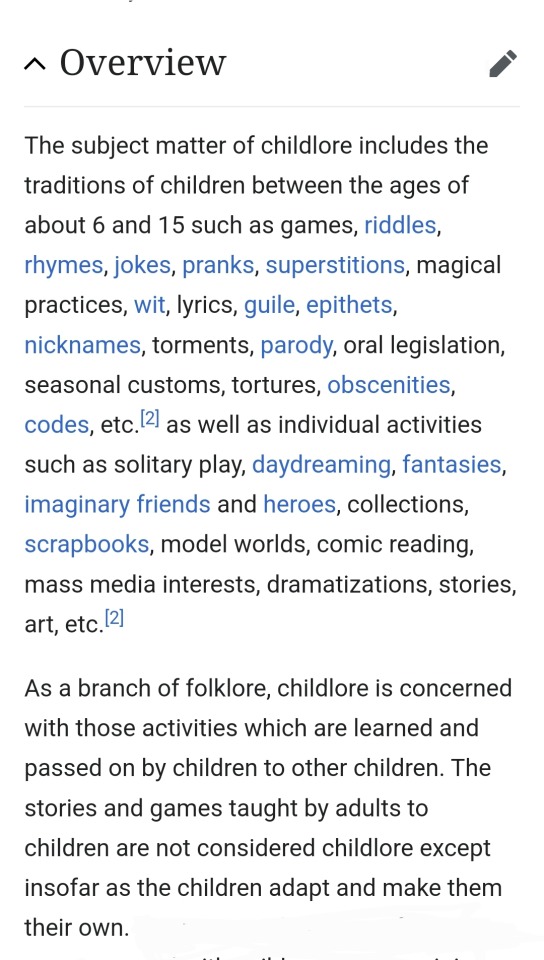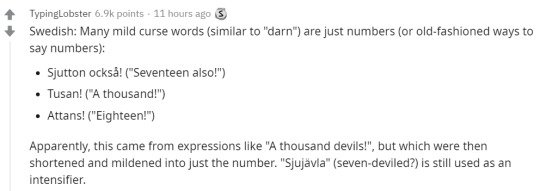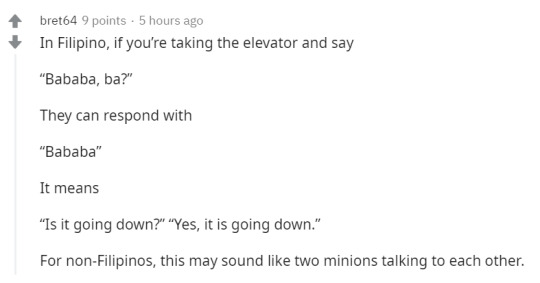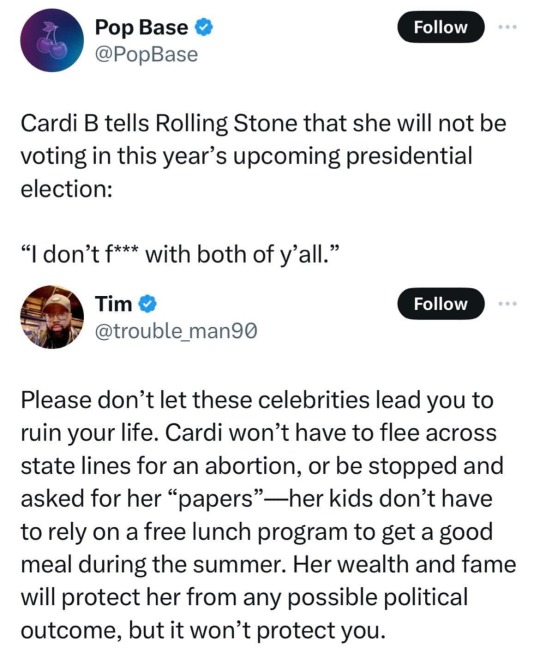accessibleacademia
4K posts
Facts, explanations, reminders, definitions, thinky thoughts
Don't wanna be here? Send us removal request.
Text
if you want your content to be more accessible, but struggle with adding images descriptions yourself, the people’s accessibility server might be something for you!! you can request image descriptions and ask accessibility-related questions. the people are really nice and we’re always happy to help :)
172 notes
·
View notes
Text
The same artist made these two 35 years apart:

1750s Henry Robert Morland (British artist, 1716-1797) A Girl Ironing Shirt Sleeves

1785 Henry Robert Morland (British artist, 1716-1797) Laundry Maid Ironing
WHICH IS SO COOL and also shows the change of fashion.
56K notes
·
View notes
Text
please learn how to code
like, if you're bored today, and not doing anything,
learn a little bit of coding please
34K notes
·
View notes
Note
got any cursed facts about falcons?? 🥺👉👈
compared to hawks, falcons have shorter and weaker talons and shorter beaks! this, combined with a lighter overall build, means that falconkind is really badly unsuited to do the hawk/eagle/owl thing where they just plunge out of the sky and stab a rabbit to death with their feet.

so what they do instead is fly really high in the air, keeping an eye out for unwary birds they could get the drop on, and then they DROP. and as they drop, they curl their talon into a fist, which they use to strike their unwary prey at speeds well in excess of a hundred miles per hour. (this either stuns or outright kills the unlucky target)

and this method works so well that they can even take down birds much larger than themselves, like ducks!

so basically,
FALCON

PUNCH
48K notes
·
View notes
Text
Remember that you must allow people to love you, to be kind to you, to help you. Not everyone is going to be toxic for you, some people just genuinely want to be a part of your life, but you to feel all this love coming your way, you have to believe you deserve it. Let people love you. Let them look out for you, care for you, don't push them away. Let them stay.
16K notes
·
View notes
Text

Haunted and excited by this being a field of study
67K notes
·
View notes
Text
shout out to “gross” disabled people.
people who can’t shower/bathe people who can’t shave people who can’t wash their clothes people who need help going to the bathroom people who have nasty habits (biting nails, picking nose, etc) people who can’t brush their teeth people who can’t go to the doctor people who can’t clean their room people who can’t make their beds people who vomit a lot people who wet the bed people who constantly have diarrhea people who’s physical deformities are seen as repulsive
and every other kind of person I missed that deserves to be here too.
you are people, first and foremost. your thoughts deserve to be heard, discussed, acknowledged, no matter what. you are not lesser. you are just another person. you should never be ignored for what you can/can’t do. you deserve care.
to abled people: check yourself. make sure you listen. and you can reblog, just don’t derail. maybe don’t add on, either.
25K notes
·
View notes
Text

my trick for getting through grad school is learning to navigate the quadrants with all their nuances
127K notes
·
View notes
Photo










Not bad for a bunch of random noises we make with our mouths. Well done, everyone.
40K notes
·
View notes
Text
5 Minutes, 5 Words - #126
⋆˚✿˖°
Despot /ˈdɛspɒt/ (n.) - a ruler or other person who holds absolute power, typically one who exercises it in a cruel or oppressive way.
A despot in power is never good news.
Emulate /ˈɛmjʊleɪt/ (v.) - match or surpass (a person or achievement), typically by imitation.
Payne's talent is emulating actors' expressions.
Eclectic /ɛkˈlɛktɪk/ (adj.) - deriving ideas, style, or taste from a broad and diverse range of sources.
Jamie is an eclectic fashion designer who has a room full of look books.
Embezzlement /ɪmˈbɛzlmənt/ (n.) - theft or misappropriation of funds placed in one's trust or belonging to one's employer.
Raymond was rightfully punished for the embezzlement of his company's funds to support illegal trading.
Forbearance /fɔːˈbeərəns/ (n.) - patient self-control; restraint and tolerance.
I developed forbearance when presented with many distractions in university - my academic performance was my first priority.
⋆˚✿˖°
Definitions from: Oxford Languages.
IPA Phonetic Transcription (UK English) from: tophonetics.com
Sentences are fictitious, though they may be based on real issues that occur across the world.
Follow @studyhaus for more vocabulary content!
36 notes
·
View notes
Text
the difference matters:
sex-positive: you want people in general to be able to sexually express themselves freely. this should ideally include asexuality. this is not about you as an individual.
sex-favourable: you want to have sex for whatever reason.
sex-neutral: you don't really have an opinion about freedom of sexual expression. this is about people in general, not you specifically.
sex-indifferent: you don't really care if you personally have sex or not, you could take it or leave it.
sex-negative: you only want people to have a limited sexual expression.
sex-averse: you don't want to participate in sex.
positive/neutral/negative refer to your stance on how sex is treated within society.
favourable/indifferent/averse refer to how you personally feel about participating in sex.
you can be a sex-averse asexual and still be sex-positive.
there's a common misconception that aces, especially sex-averse aces, are all "anti-sex", but some parts of the ace community still hasn't learned the nuance of these terms either. i still see people call sex-favourable aces sex-positive when they mean different things.
13K notes
·
View notes
Text
This is your permission to block that person!
There is no stigma attached to blocking people on tumblr. I promise.
Listen, I promise you. You can just block them.
I have blocked someone because I don’t like their art style. Their art constantly shows up in a fandom tag I follow; so I blocked that user.
Someone I follow reblogs from someone I don’t want to see on my dash so I put their entire URL in my filtered terms/ blacklist.
There was an aesthetic blogger in a tag I frequent and I didn’t want their collages/ mood boards to clog up my search results. So I blocked them.
I promise you, you are allowed to filter out and/ or block people.
People don’t need to be bad, don’t need to be annoying, don’t need to “deserve” getting blocked.
You are allowed to block people for any reason whatsoever; including no reason at all.
2K notes
·
View notes
Text
reminders for today:
if you or someone you know might need it in the next few years, purchase plan b. the shelf life of plan b is 4 years, and we might not be able to access it as easily as we can now in the days ahead.
if you are larger/plus size: go online and purchase ella instead of plan b. plan b is less effective if you aren’t under 160 pounds.
if you can, purchase books that project 2025 is looking to ban.
mass deportations are starting. if you see ice vehicles or agents, yell ice raid and la migra as loud as you can.
if someone asks who you voted for, keep your mouth shut. they’re fishing for traitors.
if anyone, anyone at all asks about your neighbors or their legal status in the us, you know nothing. don’t be the reason that their family is separated.
if anyone asks about your religion or lack thereof, keep it vague. this administration will look for any excuse to persecute you.
your friends are trans or queer? for the next four years they’re not. don’t expose anyone’s status as a trans or queer person to anyone else, even if you think you can trust them.
did someone you know get an abortion? no, they didn’t. they were never pregnant.
in short, don’t be a snitch, and keep to yourself these next four years. we’ll make it through this even if it seems hopeless at times.
we can survive this. we’ve survived before, and we’ll survive again.
55K notes
·
View notes





